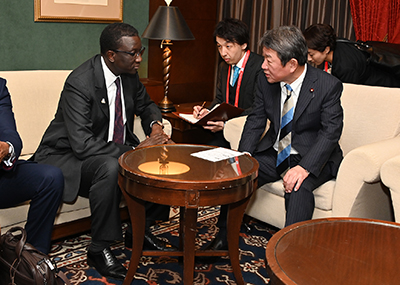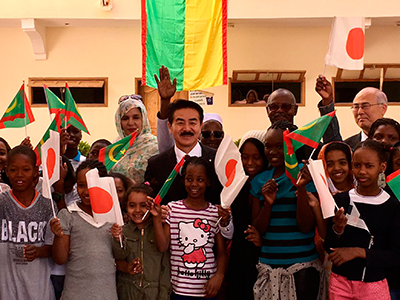Diplomatic Bluebook 2020
Chapter 2
Japan's Foreign Policy that Takes a Panoramic Perspective of the World Map
5 West Africa
(1) Ghana
Since President Akufo-Addo took office in 2017, his administration has adopted the concept of Ghana Beyond Aid, and is working to attract investment from foreign companies. Many Japanese companies are also expanding their business in Ghana.
As Japan and Ghana have a friendly bilateral relationship, 2019 also turned out to be a year for active exchange of high-ranking officials. In June, the 2nd High-Quality Infrastructure Conference was held in Accra, in which State Minister of Land, Infrastructure, Transport and Tourism Otsuka Takashi participated. In addition, in August, President Akufo-Addo attended TICAD7 and had a summit meeting with Prime Minister Abe. In October, First Lady Rebecca Akufo-Addo attended the Ceremony of the Enthronement of His Majesty the Emperor, and the chief attendant and Deputy Minister of Foreign Affairs and Regional Integration Charles Owiredu met with State Minister for Foreign Affairs Suzuki.
(2) Guinea
Guinea has been playing a role as a stabilizing force in the West African region by promoting regional cooperation in the Economic Community of West African States (ECOWAS) and by accepting refugees from neighboring countries. On the other hand, since October, the National Front for the Defense of the Constitution (FNDC), which opposes a constitutional amendment that could allow a third term for President Condé, announced that it would hold demonstrations indefinitely and all over Guinea. Demonstrations have been held regularly since then, and there have also been conflicts between demonstrators and security forces.
In August President Condé attended TICAD7 and had a summit meeting with Prime Minister Abe.
(3) Guinea-Bissau
Guinea-Bissau peacefully held parliamentary elections in March, and Japan cooperated with the United Nations Development Programme (UNDP) to provide approximately 1 million US dollars in support. In August, Prime Minister Gomes attended TICAD7 and held a summit meeting with Prime Minister Abe. Afterwards, President Vaz completed his term peacefully, the first ever case since independence. Following this, the first and second votes in the presidential election were held in November and December respectively. Japan cooperated with the UNDP to provide approximately 750,000 US dollars in support for that.
(4) Côte d'Ivoire
Côte d'Ivoire has maintained an average annual growth rate of approximately 8% in recent years and has been a driving force in the West African economy as a regional logistics hub.
Japan has maintained cordial relations with Côte d'Ivoire since its independence. In August, Prime Minister Coulibaly attended TICAD7 and had a summit meeting with Prime Minister Abe. In October, President Ouattara visited Japan for the Ceremony of the Enthronement of His Majesty the Emperor and had a summit meeting with Prime Minister Abe.
On the economic front, Japanese companies still maintain a high interest in Côte d'Ivoire, and on January 13, 2020, the Japan-Cote d'Ivoire Investment Agreement was signed in Abidjan.
(5) Senegal
Against a background of good bilateral relations, 2019 continued to be a year for active exchange of high-ranking officials between Japan and Senegal. A number of Japanese officials visited Senegal, including the January visit by Parliamentary Vice-Minister for Foreign Affairs Yamada to attend the Third Edition of the International Conference on the Emergence of Africa, the April visit by Special Envoy of the Prime Minister Mr. Kitamura Seigo (member of the House of Representatives) to attend the inauguration ceremony (reelection) of President Sall, and the November visit by Parliamentary Vice-Minister for Foreign Affairs Nakatani to attend the 6th Dakar International Forum on Peace and Security in Africa.
From Senegal, in June, President Sall attended the G20 Osaka Summit and relevant Ministers participated in a series of G20-related ministerial meetings. In August, President Sall attended TICAD7 and held a summit meeting with Prime Minister Abe. Furthermore, Minister for Foreign Affairs and Senegalese Abroad Ba attended the G20 Aichi-Nagoya Foreign Ministers' Meeting and had a meeting with Foreign Minister Motegi.
 Japan-Senegal Foreign Ministers' Meeting
Japan-Senegal Foreign Ministers' Meeting (November 23, Nagoya)
(6) Togo
After parliamentary elections in December 2018, the second Komi Klassou cabinet was formed in January 2019. Currently, third-term President Gnassingbe is working to improve the investment environment with the aim of reducing poverty through economic growth, and in November, a Japanese corporate mission by JICA and JETRO visited Togo.
In August, President Gnassingbe attended TICAD7 and held a summit meeting with Prime Minister Abe. In addition, in October, President Gnassingbe revisited Japan to attend the Ceremony of the Enthronement of His Majesty the Emperor. As President Gnassingbe also attended the Ceremony of the Enthronement of His Majesty the Emperor for Emperor Heisei in 1989 as the Presidential Representative back then, this was his second consecutive time to attend the Ceremony.
(7) Nigeria
Nigeria, with the largest population and economy in Africa, has high economic potential. While many Japanese companies are interested in expanding into Nigeria, the country is facing the problem of terrorism, mainly in the northeastern region, by Boko Haram and Islamic State (IS) West Africa Province (ISWAP).
As a result of the February presidential election, incumbent President Buhari was re-elected. President Buhari's slogan is to guide Nigeria to the “Next Level,” and he has positioned economy, security, and anti-corruption measures as the three pillars to be prioritized.
Japan and Nigeria maintain amicable bilateral relations, and 2019 was a very active year for exchange of high-ranking officials. In June, Special Envoy of the Prime Minister, Mr. Shunsuke Takei (member of the House of Representatives) attended Democracy Day ceremonies and made a courtesy call to President Buhari.
In August, President Buhari attended TICAD7 and met with Prime Minister Abe. In November, Speaker of the House of Representatives Gbajabiamila visited Japan at the invitation of Speaker of the House of Representatives of Japan Oshima Tadamori, and paid a courtesy call to Prime Minister Abe.
(8) Niger
Niger, one of the Sahel countries, has recently faced the threat of terrorism from the Islamic State in the Greater Sahara (ISGS) and ISAWP.
President Issoufou visited Japan in August and October to attend TICAD7 and the Ceremony of the Enthronement of His Majesty the Emperor respectively, and held summit meetings with Prime Minister Abe.
(9) Burkina Faso
The political situation in Burkina Faso has been comparatively stable since current President Kaboré was chosen in the November 2015 presidential election. On the other hand, there have been a number of terrorist incidents in recent years, and in January 2019, a state of emergency was declared in the eastern, northern, and southwestern regions, which remains in effect.
In August, President Kaboré attended TICAD7 and had a summit meeting with Prime Minister Abe. In addition, in October, Minister for Foreign Affairs and Cooperation Barry attended the Ceremony of the Enthronement of His Majesty the Emperor and had a foreign ministers' meeting with Foreign Minister Motegi.
(10) Benin
Since President Talon, who used to work as a businessman, was elected in the March 2016 presidential election, his administration is aiming to realize sustainable economic and social growth under the Government Action Program (PAG), the government's strategic policy.
In August, President Talon visited Japan to attend TICAD7 and had a summit meeting with Prime Minister Abe, where they discussed bilateral relations and cooperation in the international arena.
(11) Mali
In 2015, a peace and reconciliation agreement was signed between the government and northern militants in Mali. Currently, the United Nations Multidimensional Integrated Stabilization Mission in Mali (MINUSMA), French troops, and part of the G5 Sahel Joint Force (with the participation of Burkina Faso, Chad, Mali, Mauritania, and Niger) are deployed to Mali to address the threat of terrorism. Nonetheless, terrorist incidents are successively occurring.
In response to such a situation in Mali, Japan is assisting the country with providing security maintenance equipment, strengthening the capacity of the national police, and supporting the PKO training center in collaboration with UN agencies.
In August, President Keïta attended TICAD7 and had a summit meeting with Prime Minister Abe.
(12) Mauritania
Mauritania is blessed with marine resources. Japan started cooperating with Mauritania in the fisheries sector in 1977, and the fisheries industry has developed into one of Mauritania's major industries. In particular, approximately 40% of its octopus exports go to Japan.
In February, State Minister for Foreign Affairs Sato visited Mauritania and, in addition to paying a courtesy call on President Aziz, visited an elementary school constructed by the support of Japan.
 State Minister for Foreign Affairs Sato visiting an elementary school supported by Japan (February 27, Mauritania)
State Minister for Foreign Affairs Sato visiting an elementary school supported by Japan (February 27, Mauritania)In addition, Prime Minister Sidiya attended TICAD7 in August and had a summit meeting with Prime Minister Abe. Moreover, in November, Parliamentary Vice-Minister for Foreign Affairs Nakatani paid a courtesy call on President Ghazouani at the 6th Dakar International Forum on Peace and Security in Africa.
